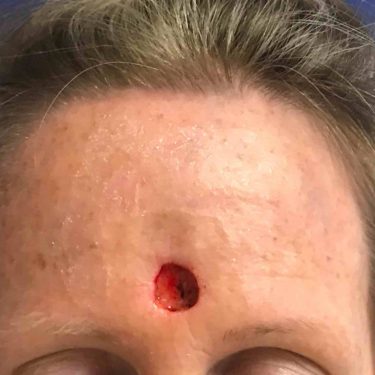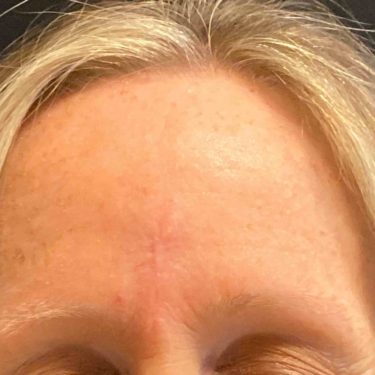Diagnosing Disease Early
Suspicious lesions or growths on the skin may indicate a pathological process.
When diagnosed early, many skin cancers are successfully treated, which is why it is important to have any dermal abnormalities evaluated by your dermatologist or Dr. Mountcastle as soon as possible. By performing diagnostic biopsies, Dr. Mountcastle can recognize and treat melanoma and other types of skin cancer before it spreads. With the assistance of his attentive staff, Dr. Mountcastle is committed to performing skin cancer treatments with expertise and compassion. Contact our Ashburn or Reston practice to learn more, or schedule a consultation.
Mohs Surgery Before and After*
See More ResultsBiopsy
In order to diagnose skin cancer, a biopsy of the suspicious tissue often needs to be performed. In order to gain a sample of the tissue, or to remove surface abnormalities, Dr. Mountcastle will shave the top layers of skin with a surgical blade so that they may be examined in a laboratory under a microscope. In certain cases a punch biopsy may be performed, removing a cylindrical sample from the core of a lesion. If the skin cancer has spread to a deeper level, additional skin cancer treatments, such as excision of the tumor or Mohs surgery, will likely be necessary.
MOHS Surgery
An advanced procedure sometimes referred to as chemosurgery, the Mohs technique allows for the complete removal of skin tumors without damage to the surrounding tissue. Not only does the microscopic accuracy of Mohs surgery precisely and effectively remove areas affected by skin cancer, but it also minimizes the chances of cancerous re-growth, and reduces the risk of post-procedural scarring. With an extremely high success rate, the precision of Mohs surgery makes it ideal for treating cancers of the face and other sensitive areas. Occasionally, Mohs surgery leaves defects that cannot be treated by the local Mohs surgeon. These patients may be best treated with a combination of Mohs surgery, performed by the dermatologist, and reconstructive surgery performed by the plastic surgeon.
EXCISION
The typical treatment for melanoma is known as wide local excision, which means that more than just the melanoma is removed. Anywhere from ¼ inch to a full inch of surrounding tissue is removed outside the melanoma, due to the high rate of local spread. The amount of skin requiring removal depends on the extent of the melanoma, and underlying tissue and fat beneath the cancerous region may require excision as well. Small excisions are easily sutured shut, while large removals of skin may necessitate a grafting or flap procedure.
RECONSTRUCTION
When carcinoma and melanoma are excised in our office surgery suites, any necessary surgery to reconstruct the treated area can often be performed during the same appointment. Dr. Mountcastle also collaborates with many local dermatologists and Mohs surgeons to provide the best possible cosmetic and reconstructive outcomes, including scar revision, when dealing with all types of skin cancers.
About Skin Cancer Treatments
While skin cancer has the potential to be lethal, it is almost always effectively treated when recognized early. Contact Dr. Mountcastle to learn more about receiving skin cancer treatments at his Ashburn, Leesburg or Reston offices, and stop the progression of melanoma or carcinoma before it spreads.
Types of Skin Cancer
Melanoma
The most serious form of skin cancer, melanoma begins in skin cells known as melanocytes. Responsible for producing melanin, which gives color to the skin, melanocytes can grow abnormally and become cancerous when exposed to extensive ultraviolet light. Although easily treatable when diagnosed early, melanoma that is left untreated can lead to serious, life-threatening cancer. Typical treatment of melanoma includes excision of the tumor and surrounding tissue. Sentinel lymph nodes are also performed in many situations as well. If lymph nodes are removed this is always performed in the hospital. If necessary, Dr. Mountcastle may perform a skin graft or flap to replace lost skin.
Paget’s Disease
Most commonly appearing on the skin of the nipple, symptoms of Paget’s disease include redness and crusting, as well as tingling, itching and a burning sensation. After a biopsy has definitively diagnosed the skin cancer, surgical removal of the cancer is often the next step. Using a skin graft or flap, Dr. Mountcastle can perform a nipple reconstruction to restore the appearance of the breast.
Although rare, when the condition affects the skin of the genital and perianal region, it is known as Extramammary Paget’s Disease (EMPD).
Merkel Cell Carcinoma
The uncontrollable growth of skin’s Merkel cells results in a rare form of skin cancer known as Merkel Cell Carcinoma. The cancer typically develops on skin that has experienced significant sun exposure, such as the head, neck and arms. Although painless, Merkel Cell Carcinoma can potentially be fatal, which means it requires prompt and aggressive treatment. If you notice a firm bump that is flesh-colored, red, or blue in color, it is important to have the abnormality biopsied by Dr. Mountcastle.
Keratoacanthoma
A malignancy that grows rapidly over the period of several weeks or months, keratoacanthoma can occasionally develop into invasive or metastatic carcinoma. In order to correctly diagnose the disease, Dr. Mountcastle will perform a biopsy. While it is uncommon, keratoacanthoma’s potential to become life-threatening often necessitates surgical treatment.
Basal Cell Carcinoma
The most common form of skin cancer in the United States, basal cell carcinoma is slow-growing, painless, and begins in the top layer of skin. Patients with basal cell carcinoma often have skin growths that bleed easily or do not heal properly. When these abnormalities are diagnosed through a biopsy, they are typically treated with excision, Mohs surgery, or cryosurgery.
Squamous Cell Carcinoma
When skin has endured prolonged exposure to harmful UV rays found in sunlight, tanning beds, and lamps, squamous cell carcinoma can develop. In order to properly diagnose the condition, a biopsy is necessary. Fortunately, when detected early, squamous cell carcinoma often responds favorably to treatment.
Skin Cancer Videos
Video GalleryFinancing Available
Financing InfoRequest An Appointment
Contact Us

